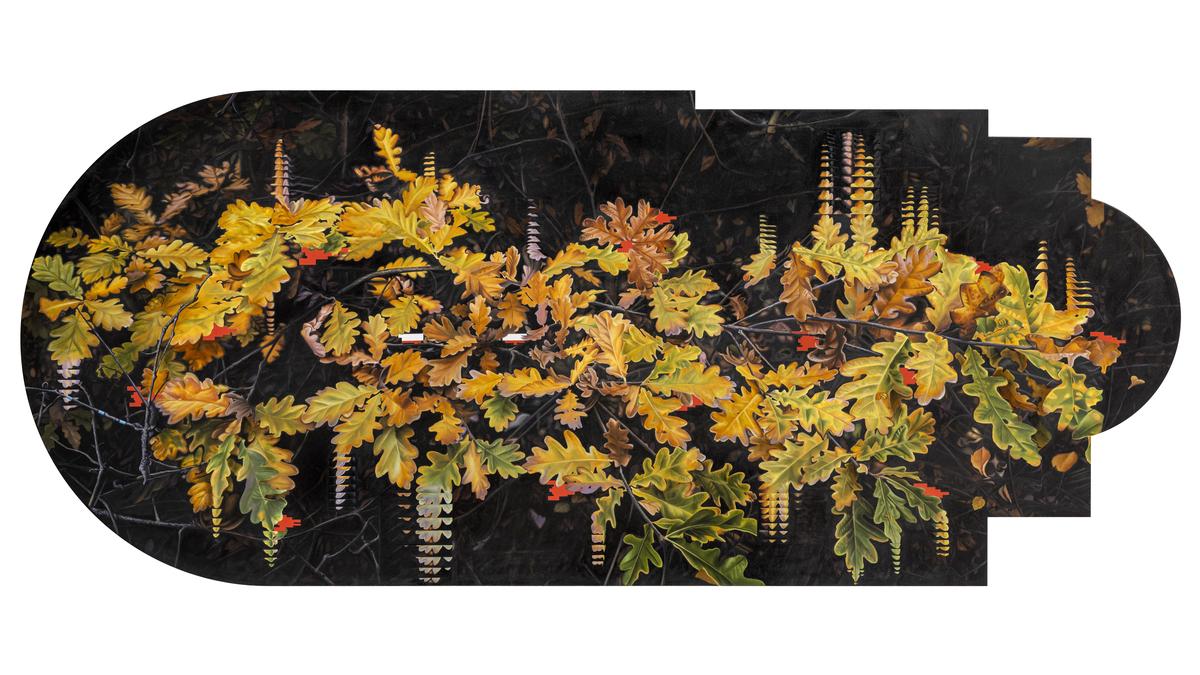
Artists bring the cultural history of trees to Mumbai
The Hindu
Contemporary art exhibition at Nature Morte in Mumbai explores glitch as metaphor for disruption and imperfection in digital world.
A glitch, once a simple digital error, has become a visual language in contemporary art — a metaphor for disruption or imperfection. The canvases at Mumbai’s Nature Morte have brought paintings titled, Arboretum - Ebb and Flow, oil on canvas, by Delhi-based artists Jiten Thukral and Sumir Tagra, together known as Thukral and Tagra. The collection of paintings by the artists respond to the relationship between the real and the digital world. The works in this exhibition draw inspiration from diverse landscapes, relaying stories on mobility, conflict, and the idea of home. The chinar trees of Kashmir, the peaceful landscapes of Japan, and the sense of belonging in Gurgaon where the artists live, seeped into the creation of this series.
Post-lockdown , the artists thought of freeing themselves from the idea of being confined to one place. Theirexercise took them to Japan, and they started wandering and documenting on the move. From the parks of Hiroshima to hidden gems in the Nezu Museum in Tokyo, they saw, felt, and soaked in as much as they could. They accessed Japan, Kashmir, and Gurgaon through the lens.
Thukral says, “We made an archive of sites, time zones, and sensations registered on the virtual cloud, for future redressal. It also made us rethink our consumption patterns of landscapes. We recollect this instance from 2003 in Japan of experiencing the beautiful zen gardens created by master gardeners. Many images of the bonsai trees taken here were lost. The memory of these gardens remains stark to date, making us wonder if the ability to store in an external memory drive has challenged our cognitive abilities to remember.”
Despite being present everywhere, trees remain invisible to our eyes. Tagra says, “We are increasingly aware that forests are not just a collection of trees, but a community that is intelligent and harmonious. It is funny that this realisation about the immense capacity of our fellow companions on earth happened in the age of artificial intelligence.”
The artists say that they started seeing trees as cultural artefacts that witness social and political transitions of the world and their works in this exhibition draw inspiration from diverse landscapes, relaying stories on conflict, grounding the self, and the idea of home. We are retelling stories through the trees that stay in us, adds Thukral.
The artists hold several memories: walking through the Dachigam forest in Srinagar and drinking water from the natural waterfall. Collecting the charcoal made from dried chinar leaves from the bazaar at Masjid Dastgeer Sahib in Srinagar. Walking on the dry fallen chinar leaves in autumn at Naseem Bagh. “These 600-year-old trees have seen millions of people come and go, enduring centuries of serenity and political tensions,” adds Thukral.
Being under the pine trees at temples in Uji, Kyoto, for them, was a meditative experience of nature. “It evokes our childhood memories of going on holiday in May every summer, connecting us to moments from the past. In our childhood, every house used to have a tree around, often in the courtyard. Next to my room, there was a bougainvillea shrub, commonly found in North Indian neighborhoods. The civic body uprooted the tree as it obstructed the view of police guards during the curfews of the late 1980s in Jalandhar, Punjab, a time marked by militancy,” shares Thukral.













